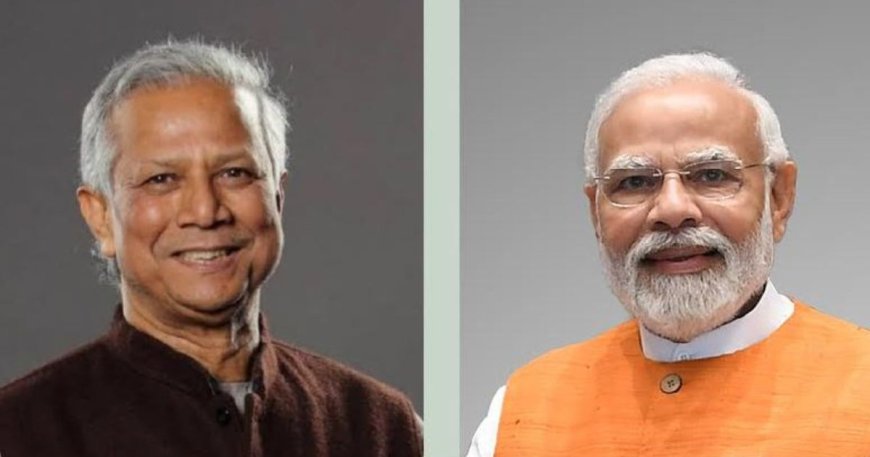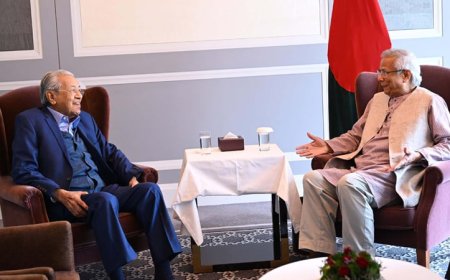A formal meeting between Yunus and Modi is unlikely at the BIMSTEC Summit
The present state of bilateral relations does not favor a meeting between the top leaders of the two nations.

Here is the rephrased version of your text:
Bangladesh’s interim government Chief Adviser, Prof. Muhammad Yunus, and Indian Prime Minister Narendra Modi are unlikely to hold a bilateral meeting on the sidelines of the BIMSTEC Summit in April, despite a formal request from Dhaka.
While Modi and Yunus are expected to be present at the BIMSTEC Summit in Thailand next month, a structured meeting on the sidelines appears improbable, according to sources familiar with the matter, as reported by Hindustan Times.
Both leaders will attend the regional summit in Bangkok on April 3-4. Bangladesh’s Foreign Affairs Adviser, Touhid Hossain, confirmed on Thursday that Dhaka had formally sought a meeting during the summit. This will be the first instance of Yunus and Modi participating in the same multilateral event.
Three individuals with knowledge of the situation, speaking on condition of anonymity, stated that the current state of bilateral relations does not favor a meeting between the top leadership of the two nations. They noted that the necessary groundwork for such discussions has not been established, especially given the prevailing tensions and strained ties.
“An informal exchange or brief pleasantries between the two leaders cannot be ruled out, as all attending heads of state will interact on multiple occasions. However, a formal meeting is unlikely,” one of the sources said.
“A structured discussion seems difficult, particularly in light of recent anti-India rhetoric from certain members of the interim government in Dhaka. Such circumstances do not support a bilateral meeting,” another source added.
On Thursday, Touhid Hossain told ANI, “We have initiated diplomatic efforts with India to facilitate a bilateral meeting between our two leaders on the sidelines of the BIMSTEC Summit.”
The summit of the Bay of Bengal Initiative for Multi-Sectoral Technical and Economic Cooperation (BIMSTEC), which includes Bangladesh, Bhutan, India, Myanmar, Nepal, Sri Lanka, and Thailand, comes at a time when relations between New Delhi and Dhaka are experiencing significant strain.
India has recently reiterated its concerns regarding the interim government’s handling of attacks on Bangladesh’s Hindu and minority communities, the deteriorating law and order situation, and the release of violent extremists from prison.
Bangladesh, on the other hand, has raised concerns over India’s hosting of ousted Prime Minister Sheikh Hasina, for whom it has submitted an extradition request. Additionally, unresolved issues such as water-sharing of cross-border rivers and the fencing of the international border remain points of contention.
Further straining diplomatic relations is the increasing engagement between the Bangladesh military and Pakistan’s armed forces, particularly the Inter-Services Intelligence (ISI). Senior ISI officials were recently part of a Pakistani military delegation that visited Bangladesh, a development viewed with unease in New Delhi.
Last September, Bangladesh had also sought a meeting between Yunus and Modi on the sidelines of the UN General Assembly in New York.
India has yet to respond to Bangladesh’s extradition request for Hasina, who is facing multiple criminal charges in her home country, including allegations of extrajudicial killings, enforced disappearances, and crimes against humanity.
Hasina fled to India after stepping down on August 5 last year. Indian leadership has confirmed that she was granted entry at short notice. While in India, she has largely remained incommunicado, residing in a secure location in New Delhi. Her occasional online addresses to Awami League supporters have reportedly angered Yunus and other members of the interim government.
In a recent development, External Affairs Minister S. Jaishankar met with Touhid Hossain on the sidelines of the Indian Ocean Conference in Oman on February 16. Their discussions covered bilateral ties and cooperation under the BIMSTEC framework.
This meeting marked the highest-level diplomatic engagement between the two nations since Foreign Secretary Vikram Misri’s visit to Dhaka in December for annual foreign office consultations.
What's Your Reaction?




















































































